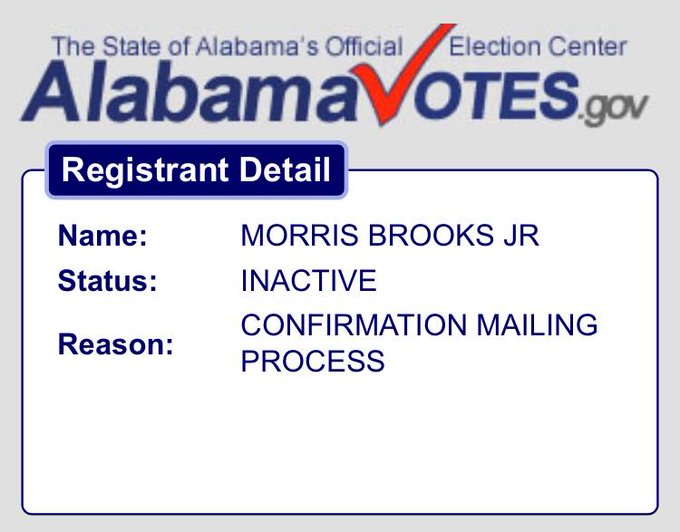
Getty Left to right, clockwise: Luther Strange, Roy Moore, and Mo Brooks.
Roy Moore, the controversial former Chief Justice who once defied an order to remove a Ten Commandments monument, was the top vote getter on the Republican side in the Alabama Senate Special Election primary, leading over the Donald Trump-endorsed incumbent, Luther Strange.
(Note: Alabamans headed to the polls on December 12. This article was on the primary. You can read the December 12 live election results and updates here.
It’s far from over, though. Moore and Strange, as the first and second place finishers, are now headed to a run off in September for the seat once occupied by Jeff Sessions, who left to become Trump’s Attorney General. That will be a fascinating race: A Trump and Mitch McConnell endorsed appointed incumbent, Strange, versus Moore, a Vietnam vet and former chief justice who defiantly refused to follow federal directive. With 99 percent of the vote in, Moore 38.9% of the vote and Strange had 32.8%. (See all candidates listed in a table later in this story).
To some degree, the special election provides a window into voter impressions of Trump in the immediate aftermath of Charlottesville, albeit in a Republican run-off in a southern state; the president has gone all in, throwing his support to Strange in a state that favored him. Strange is the short-term incumbent via an appointment by a scandal-hobbled former governor. It would have taken one candidate getting more than 50 percent of the vote to avoid a run off, and neither candidate came close to that as the night unfolded.
However, in some ways, the more bombastic, anti-establishment Moore’s messaging mirrored that of Trump himself in November; underfunded compared to opponents, but beloved by some on the far right for his stances on the Ten Commandments and same-sex marriage, he railed against Washington insiders. “WE’RE ON TO THE RUNOFF! Time for Conservatives across Alabama to unite and deliver a knockout punch to the establishment!” Moore wrote on Twitter. Strange had not yet updated his Twitter page, which trumpeted the Trump endorsement earlier in the evening.
The election was also a test of the endorsement power of Republican Senate Majority Leader Mitch McConnell, who has also supported Strange.
You can see updated, live voting results a few paragraphs down in this post.
A Strange win was never a sure thing. The Republican was in a close three-way race going into the primary with Alabama Rep. Mo Brooks and Moore, the latter of whom was ahead in the polls. The top two candidates will have the runoff on September 26.
Moore endeared himself to some on the right when he was removed as Alabama’s chief justice in 2003 “for refusing to remove a monument to the Ten Commandments,” reports FiveThirtyEight. The Moore saga doesn’t end there, though. After being removed as chief justice, he won reelection. However, he was then “suspended for declining to enforce the 2015 U.S. Supreme Court decision that legalized same-sex marriages. After losing an appeal, he resigned in April,” reports Politico.
Brooks has been U.S. Representative for Alabama’s 5th congressional district since 2011. Strange is the former state Attorney General, and some of the criticism of him stems from state controversies, not federal ones (you can read more about that later in this story). There was also a Democratic primary, with Robert Kennedy Jr. (no, not that Robert Kennedy Jr.) battling Jones, who was a well-known former U.S. Attorney. There are also a smattering of other candidates in the fractured primaries.
Here are the updated results, which started coming in now that the polls closed in Alabama at 7 p.m. central time (8 p.m. on the east coast). You can also see our running updates beneath the results, and read more about the race and candidates beneath those updates.
Results & Updates
Note: The results table below is powered by the Decision Desk HQ.
Democratic
Republican
UPDATE, 10:54 p.m., EDT
With more than 84% of returns in, the narrative of the night continued to stick: Moore had done well, Strange is in trouble, but both men are likely headed to a run off (and time will tell where Brooks’ and the other votes go). Doug Jones has a commanding lead for the Dems. The same narrative held with 99% of the returns in.
UPDATE, 10:14 p.m, EDT
The AP projection matches what we’ve been seeing all night: This looks like a Moore vs. Strange GOP run off, with Moore retaining his lead, and Doug Jones appears to be the candidate for the Democrats. That’s with more than 60% of the returns in.
UPDATE, 9:47 p.m., EDT
It’s approaching 50 percent of the returns, and Moore still leads, with Strange second. It’s looking more and more like a run off between the two men to see who will face the likely Democratic victor, Doug Jones.
UPDATE, 9:21 p.m., EDT
With 22 percent reporting, Moore had taken first place over Strange, but was not close to achieving the number needed to avoid a runoff. Jones’ margin on the Democratic side shrank slightly, but he still had a commanding lead.
UPDATE, 9:01 p.m, EDT
Decision Desk HQ political experts said that Brooks needs to do well in northern Alabama to have a chance; they also opined that, on the Democratic side, Doug Jones was “crushing it.” Pittman, a Republican, was pulling some votes from the Gulf area.
The experts reminded voters that both Trump and McConnell have endorsed Strange, although Trump has expressed displeasure with McConnell lately.
Their prediction at this point, although it’s still fairly early, was that it will be hard for Strange to avoid a run off, and that it is possible for Moore to pull ahead of Strange as more votes come in.
UPDATE, 8:50 p.m., EDT
With thousands of votes now counted, Strange was retaining his lead, with Moore in second; however, none of the candidates was close to the 50% needed to avoid a runoff on the GOP side. That wasn’t true on the Democratic side, where Jones, boosted by his name recognition as a former US Attorney with some high profile cases, had more than 70% of the vote. That’s with only 2 percent in, though. The night is young. With only 4 percent in a few minutes later, the results didn’t change much.
Meanwhile, people on Twitter were digging into Brooks’ supposed voter registration.
An Alabama political columnist noticed the same thing:
UPDATE, 8:41 p.m., EDT
Strange, the incumbent via appointment, has pulled into the lead among the Republicans, and Jones is starting to pull out with a commanding lead among the Democrats, although it’s still very early. So far, Moore and Brooks seem to be dividing the non-Strange vote.
UPDATE, 8:34 p.m., EDT
A half hour after the polls closed, Jones was in the lead in the Democratic primary, and Moore was holding a lead in the Republican primary. Even some Trump supporters on Twitter were rooting for Moore, whose defiant stands earned some GOP fans.
Here’s a reminder of what Trump said on Twitter about the race on Election Primary Day.
A reminder that, in some ways, Moore has seized some of Trump’s presidential election messaging in the race, running as an underfunded outside who doesn’t trust Washington. He told Politico, “I resent people from Washington, raising money in Washington, and sending negative ads to Alabama and trying to control the vote of the people. If the Washington crowd wants somebody, the people of Alabama generally don’t.”
UPDATE, 8:16 p.m, EDT
The polls have closed in Alabama, and the first results are trickling in. Only a single precinct is reporting. On the GOP side, Moore is ahead, but before Moore supporters get excited, be aware that the tally shows he has eight votes so far in the race. On the Democratic side, the first out of the chute into first place was Robert Kennedy Jr. with 11 votes.
People took to Twitter to announce their voter preferences.
Strange had touted Trump’s endorsement.
“I predict President Trump’s endorsement will be incredibly important because people want his agenda passed,” Strange said to Fox on primary election day. “I want his agenda passed. … He has given me his endorsement and full support. I think that will make a difference today.”
More analysis on the race:
The polling average going into the primary showed Moore ahead of Brooks and Strange, but, at 33 percent, he was nowhere near the 50% needed to avoid a runoff. According to Politico, Moore may have gained by a Strange strategy to go after Brooks instead in the primary.
On the Democratic side, the race was always a bit of a Hail Mary; according to Five Thirty Eight, “No Democrat has won a Senate race in Alabama since 1992, and Trump won the state by 28 percentage points last November.” However, Democrats are hoping that they can change things, capitalizing on voter anger against Republicans in Washington, and, perhaps, as a referendum on Trump.
Adding to the drama, there is also a Democratic primary, and one of the candidates is named Robert Kennedy, Jr., but he’s no relation to those Kennedys. He’s running against Doug Jones. Jones is a former US Attorney who, according to WBHM-TV, “is best known for successfully prosecuting the 16th Street Baptist Church bombers and helping indict Birmingham abortion clinic bomber Eric Robert Rudolph.”
Altogether, according to WBHM, nine candidates are “actively seeking the Republican nomination and seven seeking the Democratic nomination.”
There are several subtexts to the Alabama election; there’s the Trump narrative, as the election is, to some degree, a test of the power of a presidential endorsement.
Adding another twist, though, is the fact that one of the Republicans, Moore, is hardly to the left of the rest in the field, and turnout is expected to be low. It could be argued that Moore is running to the right of the other GOP candidates in the race. According to The New York Times, a low turnout would be good for Moore, many experts believe, because “his defiance has only endeared him to his supporters, who are highly likely to show up to vote in any contest where he appears on the ballot.”
Trump recorded a robocall for Strange in addition to tweeting his support. “He is helping me in the Senate and is going to get the tax cuts for us. He’s doing a lot of things for the people of Alabama and for the people of the United States,” Trump said in the robocall, according to CNN.
If Strange doesn’t come in first, there may be multiple reasons for it, including some unique to Alabama as opposed to Washington.
Some observers say that Strange is struggling to hold onto the seat in part because he’s had tense relationships with some in the Republican establishment in Alabama as well as dealing with continued fallout over the fact he was appointed to the seat by former Gov. Robert Bentley, who was being investigated by the Alabama Attorney General’s office at the time Strange was interviewed for the Senate post. Strange was the state’s Attorney General at the time of his appointment to the Sessions’ Senate seat.


